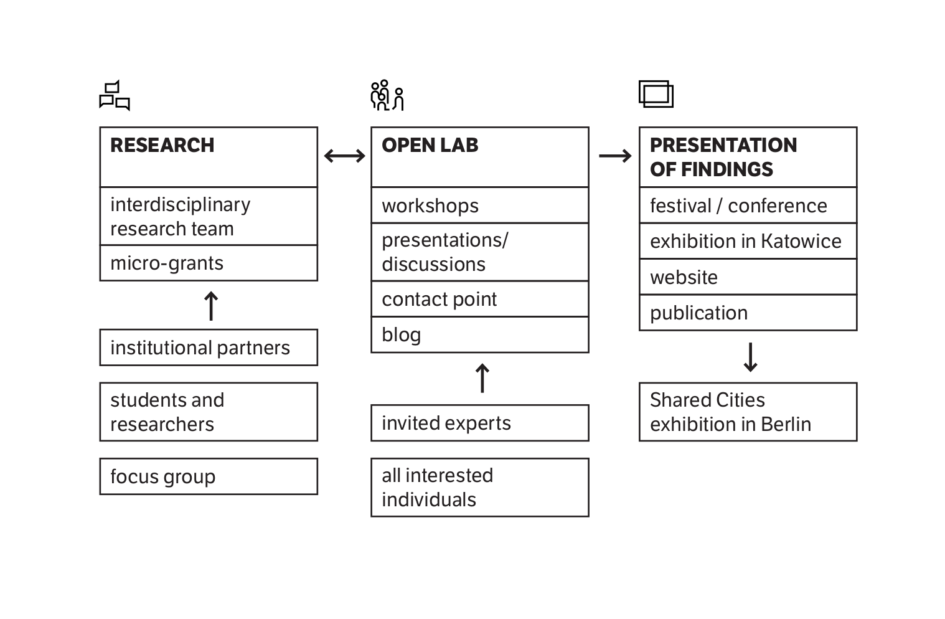How to identify and present the rich network of creators of culture in Katowice, including major events organisers and official institutions, but also the city’s enthusiasts, activists and supporters working on the Web? Where do Katowice’s concert and festival goers or participants of meetings, discussions and workshops actually come from? How do they use the city’s public space and how does this space interplay with web-based activity? How do social media users create modern urban identities, discovering their local heritage, including traditions, historic industrial facilities and iconic architecture?
Culture in Polish cities has been entirely transformed, as large investments in public infrastructure have fused with a real boom in grassroots initiatives realised in urban spaces, private homes and clubs. The multitude of available lifestyles and ways of spending leisure time has influenced our culture participation models to an extent comparable only to the impact of the digital revolution, through which we gained unlimited access to cultural products and the ability to publish our own content.
Meanwhile, cultural studies and resulting urban strategies and policies have demonstrated little success in adapting to the changing environment. Consequently, we tend to perceive culture in isolation from the education system or social and economic life, regarding it as something of a theatrical production with little or no relevance to the real problems of the city. Commentators and researchers rarely notice bottom-up, often fleeting initiatives taken by the residents, activists and other informal actors creating the city’s dynamic cultural environment, let alone the hard-to-grasp impact of the web and social media on the cultural landscape of the city.
Thanks to mapping cultural actors, such as grass-roots artists, content promoters and city enthusiasts, but also official entities, we will attempt to visualise Katowice’s network of culture creators, while identifying where the consumers of selected projects and institutions come from and how they use their services. We will also try to examine how network users use social media to create modern urban identities based on various local heritage components, such as stories that remain alive within the local community, industrial traditions and iconic architecture. Finally, we aim to provide source materials that may help answer the question whether, indeed, Katowice has undergone a cultural revolution in recent years.
As an important part of the project, we will use data and digital tools to help capture processes on the Web with particular focus on social networking sites.
By digging into official data repositories, we will try to make the best possible use of the analytical potential of the digital tools applied by Medialab. Great importance will be placed the methods of data collecting, processing and sharing, so that the results of our work, including tools, methods and data itself, may also be of use to researchers, journalists, officials, urban activists, cultural institutions, non-governmental organisations and other interested parties.
The outcomes of these activities will be presented in September 2017, as part of an exhibition and festival specially prepared to sum up the project, as well as a publication to be released in early 2018. From October 2016 onwards Medialab Katowice’s office, based in the premises of the Institution of Culture Katowice: City of Gardens Square in Plac Sejmu Śląskiego, will operate a contact point, where all those interested in our research will be able to obtain information about current activities, make comments or discuss the project.
The study is carried out as part of Shared Cities: Creative Momentum, a project delivered jointly by Medialab Katowice and Katowice City of Gardens in collaboration with the Goethe Institute (DE) and the Czech Centre (CZ), reSITE (CZ), Association of Belgrade Architects (RS), KÉK – Contemporary Architecture Centre (HU), KUNSTrePUBLIK (DE), Mindspace (HU), ResPublica (PL), Stara Tržnica (SK), Vysoká škola výtvarných umení in Bratislava (SK). Partner: Regional Institute of Culture, Katowice.
How to get involved?
You can join our activities by taking part in one of the workshops or working group meetings (dates will be regularly updated on Medialab’s website). You can also get a microgrant for the implementation of a small research project, a database, an application or a project designed to map Katowice’s culture. We are interested in ventures that will present various aspects of the cultural life of the city, both in public space and on the web. We are looking for people who will e.g. help us describe Katowice neon signs, artistic interventions in public space, but also city-forming activities in social media. Such research can take on any form, such as mapping, queries, surveys, interviews, visual studies, series of photographs, databases, applications, etc., but we will favour those projects that are capable of generating quality open content to be of use to subsequent research projects.
Project founded by Shared Cities: Creative Momentum.
Shared Cities: Creative Momentum is a European cultural platform addressing the contemporary urban challenges of European cities. SCCM is a joint project of Goethe-Institut (DE), Czech Centres (CZ), reSITE (CZ), Academy of Fine Arts and Design in Bratislava (SK), Association of Belgrade Architects (RS), Hungarian Contemporary Architecture Centre – KÉK (HU), Katowice City of Gardens (PL), KUNSTrePUBLIK (DE), Mindspace (HU), Old Market Hall Alliance (SK), Res Publica – Cities Magazine (PL). Co-funded by the Creative Europe Programme of the European Union.
